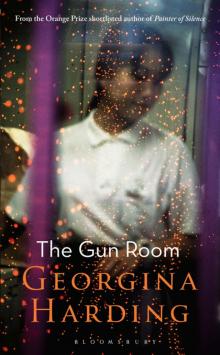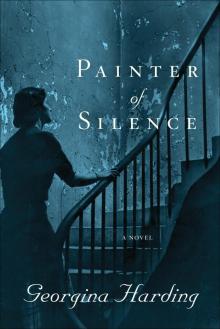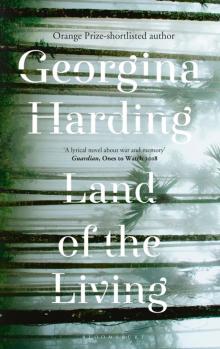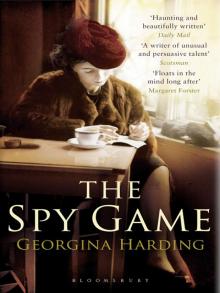- Home
- Georgina Harding
Land of the Living
Land of the Living Read online
LAND OF THE LIVING
The land of the living, sister,
Is neither here nor there.
We enter it and we leave it.
The dead in the land of the dead
Are the ones you’ll be with longest.
Seamus Heaney
The Burial at Thebes
ALSO BY GEORGINA HARDING
FICTION
The Solitude of Thomas Cave
The Spy Game
Painter of Silence
The Gun Room
NON-FICTION
In Another Europe: A Journey To Romania
CONTENTS
Also by Georgina Harding
How you could hate the crows
Shangri-La
Home soon, my darling
Glad you made it out
Go, today, the Viking said
Plough
What the jungle saw
Most courageous are the Belgae
Also available by Georgina Harding
Perhaps it was only a leaf. Just one of those big hard tropical leaves gone dry and twisted and discoloured.
Something like that, caught on a dangling strand of moss or creeper in its falling.
A burst seedpod or a wilted flower.
Yet it looked deliberately placed, suspended from the branch of a tree that overhung the path, an ancient tree that seemed totemic in itself, situated as it was right on the crest of the ridge. It hung just above eye level where anyone who came by could not fail to see it, equally visible from either direction, sky behind it, the one open piece of sky there was amid all the dense cover of leaves.
Like a sign. Not chance.
That patch of light up ahead drew the eye like the end of a tunnel, and the thing at its centre, which wavered against the light so that detail and dimensionality were unclear.
He saw it first from low on the slope, looked up to it again and again as he climbed. The slope was steep so that he had to keep his eyes on the ground, on the rocks and roots, the deceptive heaps of leaves and slides of mud. He watched his feet, his boots falling heavily as his breath. He watched for insects, saw snakes in fallen stems, skirted thorny plants that threatened to close in across the path. Then once more he looked up to the light, and the little hand. That was what it looked like, the hand of a child.
He told himself that it was only his fear, that caused him to see horror in a dry leaf.
Almost, it is a hand.
But furry. And long-fingered, not child-stubby.
Not a child’s hand but a monkey’s paw.
It has been severed at the wrist, the hard bare pad of the palm stuck through with a bamboo spike, fingers splayed about the rough hemp string on which it is suspended, which is tied to the spike on either side of the flesh.
His own hand reaches out, tentatively as if to touch, but he doesn’t touch. He only looks. He examines the monkey’s hand and then his own, turning it slowly before him as if it might be some naturalist’s specimen not connected to himself. His eyes pass from the one to the other. Fingers, thumb, mound of Venus, cupped palm; one palm spiked through, the other empty; each bearing its similar pattern of lines.
Not human. But some human has put it there.
It has been days since he has seen a man. He has seen monkeys, heard them more often than he has seen them, crashing through the foliage or chattering like a mob of children, so that sometimes he has thought there were children, waves of wicked monkey children playing in the trees above his head, laughing at him and screeching out their games – but he has neither seen nor heard any men. Three days it has been. Almost two of those days he has been on this path. He had first distinguished it where there was a kind of clearing, where the trees stood apart and there was clear ground beneath, and there was this apparent trail leading away between the mossy trunks and branches, narrow as an animal trail and yet it seemed to have an intention to it that suggested it was made by men, appearing to hold direction even as it wound back and forth, upwards or downwards, always upwards or downwards and never level, and some few hours ago – yes it was this day, he is sure, and not the one before – he saw in the mud the clear indentation of a man’s bare foot, the heel holding water. Now here is this monkey’s hand. No, not hand, paw.
Did that man come by here?
What sort of man was he, hunter, or warrior?
Dirt in the lines of the monkey’s paw, a flaking rusty trail of blood. On his hand, engrained, the finer reddish dirt from the soil.
What is the difference, here in this place of war?
This is a place of war but where he has walked orchids flowered, high above him, pink and white and purple, bursts of colour rootless in the trees.
Shell bursts.
The flowers were like shells, Luke had said, bending his long back to pick up a fallen one from the ground. The form within was like the form within a shell.
So far it had fallen. Not jungle but ocean above. The trees submerged. He, they, in the dim depths looking up.
These last days and nights his companions have been only those in his mind: thoughts that connected and disconnected, that took on words and answered one another, question and response, to and fro. Sometimes he has spoken them aloud, but only to himself, and known it at the time even as he was speaking to someone other. Yet he has not been so far gone that he did not know that he must be silent if there was a man ahead.
Hush, he had said when he saw the footprint, the word a grey veil floating down on his breath. Hush, as he might have said it to the others, or as one or other of them might have said it, soft as telepathy, no need to speak or even whisper audibly as they all of them would have seen and thought the same thought.
There is a man ahead, some barefoot hunter, headhunter, hand-hunter, brown feet padding the path before them, and they must be silent. Or some other kind of hunter. Is it some Jap trick that now they remove their boots?
Once he had spoken they were with him again, the four of them walking the more silently through the jungle, watching the immediate path ahead, looking up to the trees fearing snipers or ambush, looking ahead and to the side and looking down, careful to look where each foot was placed, the man following placing his foot in the steps of the man in front, careful to brush no foliage, he pausing to hold back a frond with his rifle barrel for the man behind, walking with relief at the softness of mud or of sodden leaves on the ground, all his senses on the alert, even his skin alert, sensitised to the slightest sounds and to the smells that came to him from the trees and the undergrowth, wafting smells or smells disturbed by his movement, rank scents and heady perfumes of jungle plants.
The Japs must have come this way, or some pieces of this way, leaving occasional indications of their passage, opening a path, disappearing as the leaves and creepers closed behind them. Japs, one behind another, silent and single file, as they filed now.
On a path such as this one they would move only in single file, Walter leading, he at the rear. No point putting me up front, Walter would say, never gone farther than Norwich ’fore they brought me here. It was English woods that Walter knew. Spinneys and stands and breaks – and those planted only to make the pheasants fly. What Walter knew was open spaces. The flat. Stubble. Beet fields where birds found cover into the winter. It wasn’t as if gamekeeping in Norfolk prepared a man for the jungle, but all the same they liked to have Walter lead. They trusted his sense of the wild more than their own, even when he led them into a thicket of thorny bamboo, the patrol lost then in a labyrinth of thorns, torn, silently cursing, unhooking vicious needles from clothes and from skin. You bugger, Walter, what do you think this is, a gooseberry patch? Tommy hissed ahead of him, the hiss carrying farther than was meant.
Hush, Tommy.
>
That word no more than a falling breath.
Where they came out from the bamboos, the vegetation became suddenly open. There was space between the trees for men to move apart, visibility high into the canopy, visibility at ground level in which men might see but also be seen. This must have been because of the altitude, that they had climbed so much higher. They stopped, took bearings, corrected their direction. Walked on, still climbing, spread now into a diamond formation, Walter at the point, he and Tommy the two flanks, Luke the runner at the rear, walking slowly, lightly, stepping like cats as they had been trained. Pausing at every few steps, eyes peeled, as trained, scanning arcs in every direction.
At any unidentifiable noise they held still, fingers to lips. That too was training. The answer to noise was silence. In silence things could be heard. In silence they became aware of every small sound down to the drip of moisture from leaf to leaf. They looked to each other, to each other’s eyes, if they could see each other’s eyes, signalled with their hands if they could not; and only when the noise had died away did they move on.
Tommy saw first. Tommy, always so quick. He whistled a single sharp bird-like note, pointed away down the slope to his right, to a narrow clearing where light shafted down. It was the site of a Jap camp, atrocity there plain for them to see, and yet they had to take their time, even though they could observe no life there but only death, and circle the clearing before they entered, climbing around and about it, cautious as hyenas about a lion kill.
How you could hate the crows
I’ll make the fire, Charlie had said, leaving her in the kitchen, but he had gone instead to the hall and let himself out at the front. The dog had sensed his going, skittering behind him over the polished wood floor. Dogs are quick to sense when a man is going for a walk – but so was she, sensing the emptiness opening again about her in the house. He must have waited a moment at the door to let the dog through before he closed it. When he was gone Claire wiped her hands dry, that were wet and cold from scrubbing potatoes, and went to make the fire herself. From the sitting room she saw him walking out into the beginning of the dusk, loved in that moment his tall figure, a lone vertical moving across the flat, with that of the retriever – long-haired, feather-tailed – flowing gold beside him, the two of them passing smoothly out of the gate and down a track, beneath a tall hedgerow – that gold too, so late the leaves had lasted – towards a stand of Scots pine.
Khaki cloth ribboning to the ground. Lengths of khaki cloth holding men to trees. Turbans. Sikh soldiers tied by their turbans, their loosed black hair tangling in the folds.
They circled and all was still save for the flies. They entered the circle amid the buzzing of flies.
Untie.
Untangle.
Lay flat, line up upon the ground.
Bury.
He could not bear to look upon what was beneath their hands.
Dig.
The thunk of metal into wet earth.
He walked a straight line out along the track through the field, turned a right angle at the end of it to follow the hedge. Straight lines. No tangle here. All straight lines. No sign of memory in this landscape apart from the square tower of the church which was all the distance he could see. No sound but the hollow thud of his boots and the occasional panting of the dog when she came to his side. He and the dog the only things moving, and a few birds spilling down towards the Glebe Wood.
The mist had seemed to come from everywhere, down the shafts from the canopy and up from the forest floor, between the leaves and the suspended creepers and the trunks of trees and the moss that dripped from their branches. The canopy was gone, the orchids gone, even the trees. Scents were gone, save for that of the mist in their nostrils and that of the soil which they broke with their spades.
The field was freshly ploughed, a sheen to the cold waves of upturned earth along the furrows. This mist here was no more than a faint layer, a fine ground-hugging English mist dissolving the surface of the land ahead. The dog ran on, then returned to him. They walked to the far end of the farm where there was grass and the herd had been out through the day. Though the cows had been brought in their smell hung over the pasture.
He had been walking a long time when the mithun came to him. He had slept out two nights alone, and woken and walked again for hours and seen no one. The mithun came through the cloud of the high jungle like a shadow, warm air blowing from her nostrils; smelling the human, thick cow-tongue licking the salt from his skin.
He heard her before he saw her, lumbering sounds on the soft leaf floor, snuffling, her dark form looming between mossed trees and hanging creepers. No threat to her, only size, her size and her slowness soothing as if she too should not be here in the misty tangle of the jungle but out in some green field, a big dark horned beast like a buffalo but gentle as a cow, she came to him, and her calf behind her, and looked to him with her dark eyes and put her black nose to his hand. Mithun were tame beasts. Where there were mithun, there should be a village close by, or a herdsman at least, walking with his animals deep into the jungle and away from the war. He looked. Waited. No one appeared. If there was a village he could not know in which direction it might be found.
That night again he slept out. He found a place where the roots of a vast tree stood in tall folds above the ground and there he made himself a kind of tent with his cape. It rained in the night and the sound of the rain on the cape seemed to him like massed men running.
Claire had the lights on inside the house; the two windows of the kitchen bright, a glimmer from the hall filtering through windows of other rooms. He turned back towards the rectangles of light. No need to go round and come back in at the front; she would know by now that he was out. His boots were muddy anyway, and so was the dog. When he got into the yard he could see into the kitchen and see her cooking supper, her figure moving first at one window and then the other, a slender dark-haired young woman in a blue-checked apron putting out some carrots to chop, a saucepan boiling on the Aga behind her. She had the wireless on. He could hear the thin radio voices that kept her company.
The dog pushed in past his legs.
You were out a long time. She smiled. Her smile was bright for him.
I went further than I meant to.
Isn’t it pitch dark out there?
She crossed the room to draw the curtains and shut out the blackness. The dog curled in its place beneath the table at the end closest to the stove.
Won’t be ready for a while. She went back and took up the pan and brought it to the sink, draining the water from it. She looked prettily flushed with the steam rising about her, loosening a curl of her hair.
Time for a drink. Do you want one?
In a minute, darling. Take them into the sitting room and I’ll just get this in the oven first. I lit the fire.
Whisky for him, and water. For her, gin, ice, tonic.
She was mashing potato, then spreading the potato over a bed of mince, forking the surface.
There’s half a lemon in the fridge.
Yes.
Of course, he cut it yesterday. Yesterday too he had come in and made their drinks like this, halving then quartering the lemon, the lemon stinging a small cut on his finger, he as detached from the action then as now.
The sitting room was dark when he entered it except for the glow of the fire. He drew the curtains and tended the fire then sat down in the armchair beside it with the whisky glass in his hand. The room only began to seem inhabited when the dog followed him in.
They had been sent to fight in a place of cloud. Sometimes the cloud was above them and other times it was below them as if the ground on which they stood was floating, as if they had come to an island and the cloud was the sea.
It was a place none of them had ever heard of and he did not think that the Japs would have heard of it either.
The cloud hardened and turned to rain. The lines of soldiers stalled. They put on their capes, even as they did so the column
backing up behind and pressing them on. They marched on with the column looping down the mountain behind them, shining shrouded soldiers in monsoon rain. It was the kind of rain you might have imagined on a ship at sea, water the only element, hard spray against their faces, the wash of it at their feet.
They had come so far for this. A ship to India. Trains across India. Then this march up from plain into mountains. The Japs had had a worse journey of it, cutting their way through a thousand miles of jungle, but they would not know that until later when they began to follow where the Japs had fled. The road on which they marched was newly built for the purpose, rock freshly broken, surface laid, Meccano bridges the width of a tank thrown over rusty torrents thick with washed-away soil. Already the rains were washing away the new surface, sliding land upon it, spilling down the raw cuts in the mountains, erasing the Army’s passage even as it was made. Heads down, they had stumbled up, turning bends, gaining height, walking into cloud, walking above cloud. And at last they had come to the pass and looked down on the cloud, and heard the sound of battle within it. There they stood to. The night was cold – and dry, that a rare thing – and they heard the battle intensify in the darkness, and they saw the flashes of it and slept only little, but in the dawn that followed there was a moment of stillness, and then they looked and saw the jagged mountains blue in every direction, and in this moment that was without fighting and without cloud they could see the vast bare arena of the battlefield, the smashed valleys and ridges and hilltops below; and even as they saw it, as the sun was rising and the yellow fading from the pale sky, there were the puffs of renewed artillery fire, the blasts carrying up to them in a separate time and unconnected, and slowly as they began the march down the clouds began to pour into the space again, strands of them slowly massing and spilling over the ridges and rolling out until all the view was gone.

 Harvest
Harvest The Gun Room
The Gun Room Painter of Silence
Painter of Silence Land of the Living
Land of the Living The Spy Game
The Spy Game The Solitude of Thomas Cave
The Solitude of Thomas Cave